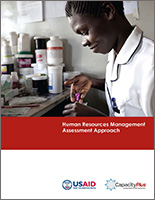 Strengthening the human resources management (HRM) of the health workforce is essential to improve the quality of family planning, HIV/AIDS, maternal and child health, and other key services, and to ensure that global investments to increase the number of trained health workers are supported and sustained. The Human Resources Management Assessment Approach is designed to guide policy-makers, managers, and human resources practitioners toward better understanding and responding to the HRM challenges facing their health systems. The approach promotes the collection and analysis of information on defined HRM challenges and informs the development of policy, strategy, systems, and process interventions to respond to challenges in four key areas of HRM: health workforce planning and implementation, work environment and conditions, human resources information systems, and performance management.
Strengthening the human resources management (HRM) of the health workforce is essential to improve the quality of family planning, HIV/AIDS, maternal and child health, and other key services, and to ensure that global investments to increase the number of trained health workers are supported and sustained. The Human Resources Management Assessment Approach is designed to guide policy-makers, managers, and human resources practitioners toward better understanding and responding to the HRM challenges facing their health systems. The approach promotes the collection and analysis of information on defined HRM challenges and informs the development of policy, strategy, systems, and process interventions to respond to challenges in four key areas of HRM: health workforce planning and implementation, work environment and conditions, human resources information systems, and performance management.
